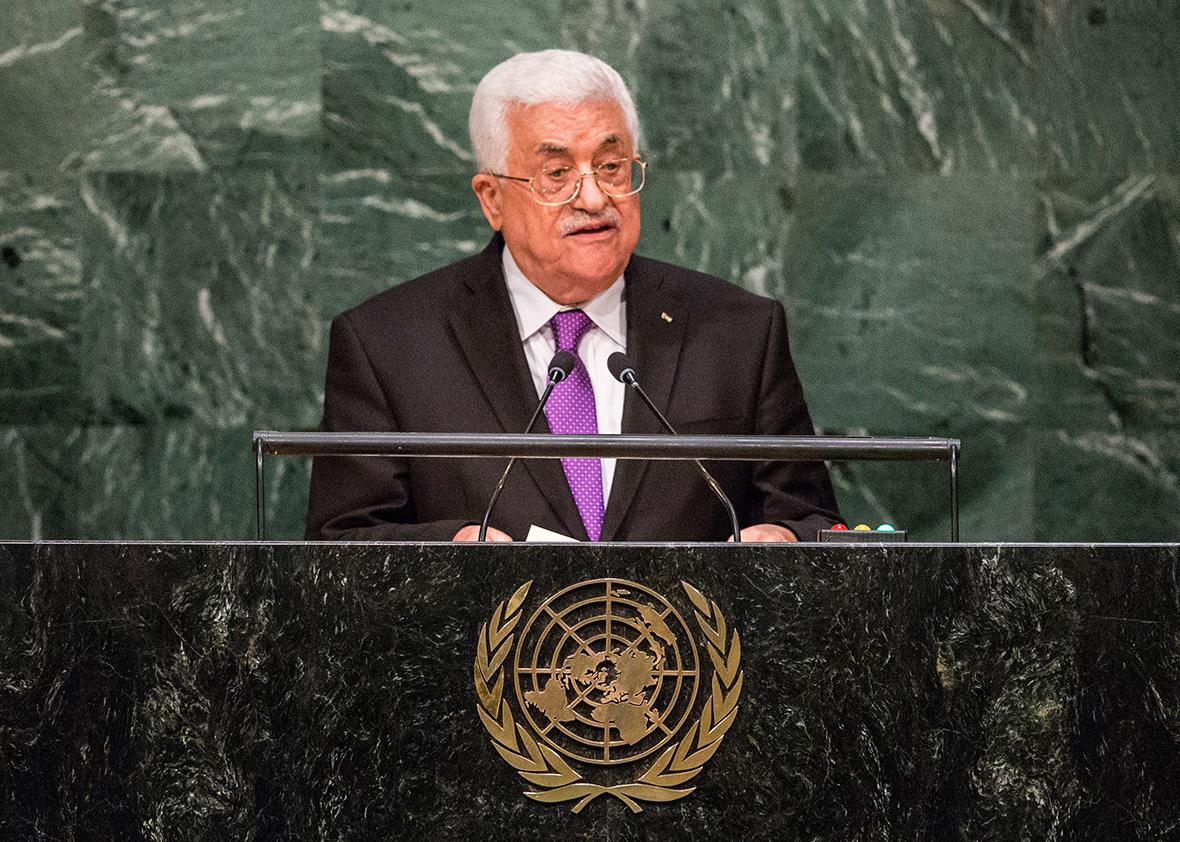In the days leading up to his speech Wednesday to the United Nations General Assembly, Palestinian President Mahmoud Abbas had promised something big—a “bombshell,” he told reporters. He did not exactly disappoint: Abbas used the speech to announce that the Palestinians would no longer be bound by the Oslo Accords, the historic 1993 agreement between Israel and the Palestinian Liberation Organization that created the Palestinian Authority. The agreement contained a set of interim arrangements, giving the Palestinians a small measure of autonomy in the occupied West Bank and Gaza, and was supposed to last five years, at which point a final peace treaty would be signed between Israel and Palestine.
Twenty-two years after Oslo was signed in Washington, and PLO Chairman Yasir Arafat and Israeli Prime Minister Yitzhak Rabin famously shook hands on the White House lawn in front of a beaming President Bill Clinton, the Palestinians haven’t moved appreciably closer to their goal of national self-determination. The Middle East is undergoing a period of intense crisis unmatched in modern history, presenting a considerable challenge to the Palestinians to even keep their liberation struggle on the international agenda. (President Barack Obama didn’t even mention the Israeli–Palestinian conflict in his speech to the U.N. earlier this week.) But Abbas’ headline-grabbing gambit today gets his people nowhere.
The Israeli occupation is as deeply entrenched as ever. The number of Israelis living in settlements across the West Bank has tripled since 1993, with members of the settlement movement now occupying key positions of government power. Terrorist attacks by Palestinian militant groups during the Second Intifada dramatically weakened the Israeli peace camp. And the Palestinians remain politically and geographically divided between Hamas-controlled Gaza and Fatah in the West Bank. A recent poll by the Palestinian Center for Policy and Survey Research showed that, for the first time in many years, a majority of Palestinians no longer support a two-state solution, and nearly two-thirds of Palestinians want Abbas to resign.
Given these realities, it’s understandable that Abbas might seek to make some news with a bold and historic speech. “It’s unconscionable that the question of Palestine remain unresolved,” Abbas told the assembled body today, in a familiar refrain. “The continuation of status quo is unsustainable.” After reciting a litany of Israeli violations of past agreements, Abbas declared, “We cannot continue to be bound by these signed agreements with Israel and Israel must assume fully all its responsibility as an occupying power.”
OK, one might ask, or what? What does it actually mean to back away from the Oslo Accords, the agreement upon which his governing authority, as highly attenuated as it may be, is based? Here the speech offered nothing.
It’s worth noting here that Abbas is largely correct when he claimed that the Palestinians had met their commitments while Israel has ignored its own, particularly with regard to settlements, which U.S. officials have blamed for the collapse of the most recent round of peace negotiations in 2014. What Abbas didn’t do was offer any sort of plan to change this. In reality, Abbas’ speech offered the worst of both worlds: It delivered nothing tangible for the Palestinians, while at the same time handed the Israelis something inflammatory to bash him with.
Israeli Prime Minister Benjamin Netanyahu (who described in a secretly recorded video how he had deceived the U.S. in order to undermine the Oslo Accords) was quick to pick up the cudgel, immediately issuing a statement that the speech was “deceitful and encourages incitement and lawlessness in the Middle East.”
It’s hard to see the speech is as anything but the latest in a series of Abbas’ tactical maneuvers—like the 2012 U.N. bid, like joining the International Criminal Court—aimed primarily at boosting his flagging domestic political legitimacy. But the result is to damage his credibility in the eyes of the international community as a leader who can deliver a final peace accord.
Shortly after his speech, Abbas attended a ceremony in which the Palestinian flag was raised for the first time at United Nations headquarters. Wednesday’s speech and the raising of the flag may well generate yet another political bump for Abbas, but in the absence of an effective strategy to address the radical power imbalance and create genuine consequences for Israel—for example, through a U.N. Security Council resolution on settlements, as was suggested last week in Washington by Palestinian Ambassador at Large Husam Zomlot—it will be momentary. To the extent that the tools created by the Oslo Accords long ago ceased to be of any real help to Palestinian national goals, Abbas deserves credit for declaring that era over. The challenge now will be to define the new era.
